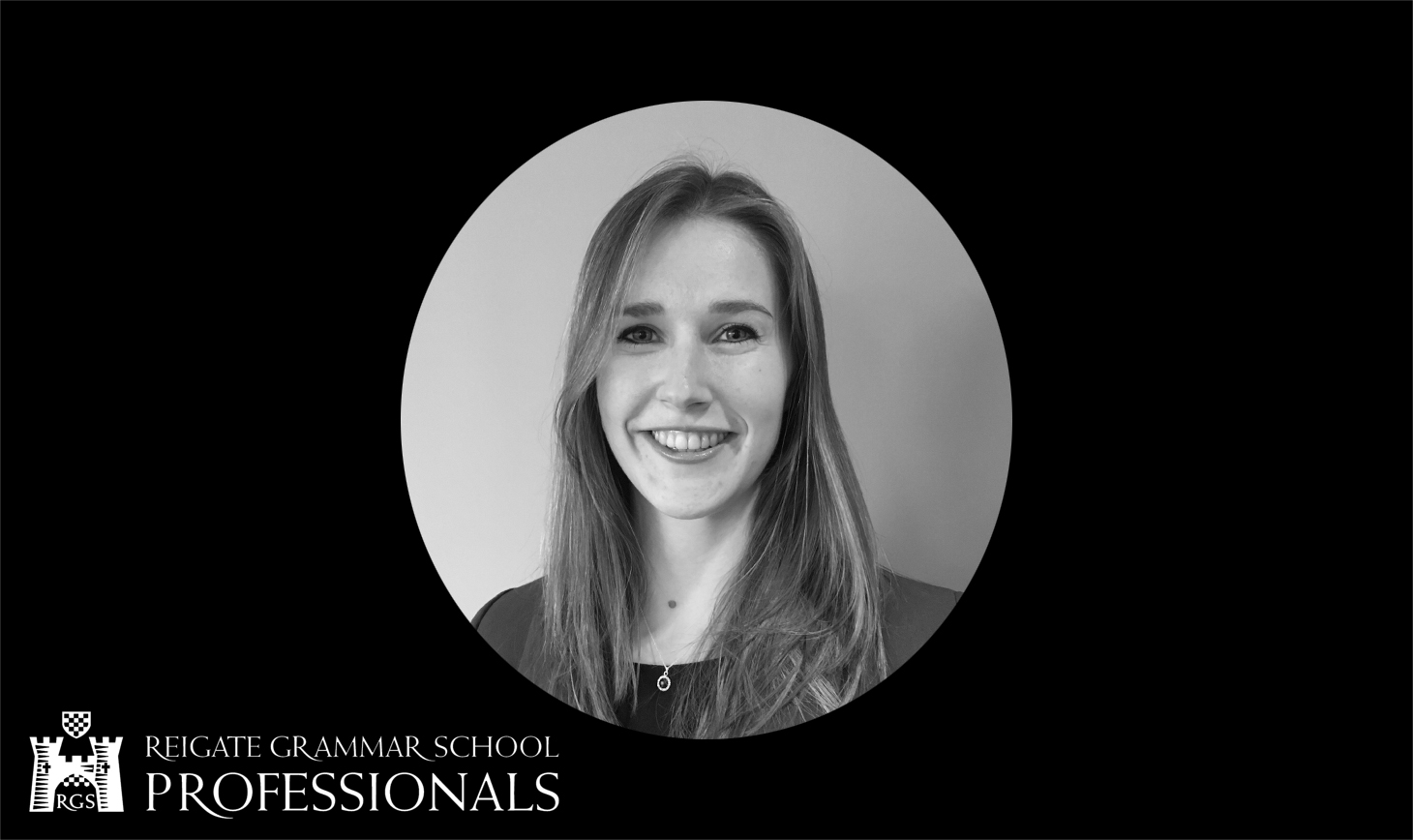
Member Spotlight: Camilla Ayling
What does it take to become recognised as a top emerging talent in the Wealth and Investment management industry? Camilla Ayling (née Finnegan) this year won the accolade of being one of the Top 30 under 30 having been at Rathbones for just three years. She studied at RGS between 2003 and 2010, along with her now husband, James Ayling.
Could you talk a little about your journey from RGS to where you are today?
When I left RGS in 2010, I headed to the University of Bath to read Economics. Bath is such a beautiful city and so it was an absolute pleasure to study there. I made some friends for life, had a really fun three years, and graduated with a BSc (Hons) 2:1. My field of study naturally lent itself well to establishing a career in Banking/Finance. Over my 2nd year summer holiday I interned at Barclays Wealth & Investment Management, which ultimately led to a graduate job offer at their HQ in Canary Wharf. I was keen to move to London so packed my bags and rented a spare room in Canary Wharf to be close to the action…only to find out on Day 1 that I would be placed in the Mayfair office! I soon relocated from that flat to settle in Greenwich which I love living in. After gaining great experience from three years of rotating around the bank in different teams, I decided Equity Research was for me. Rathbones offered me an analyst role and I have been working there ever since (over three years). Six months ago I got married – to my “high school sweetheart” you could say. James and I started dating at RGS in Sixth Form and celebrated our ninth year together on our wedding day; so RGS definitely played an important part in our lives!

What does your job role entail?
I am responsible for conducting equity analysis on UK, European and US stocks. The aim is to actively seek out alpha generating ideas to deliver the best possible outcomes for clients. I cover a wide range of sectors such as Retail, Tobacco, Travel & Leisure, and Real Estate. I sometimes speak directly to our end clients (high net worth individuals) but most of the time I am interacting with and advising the hundreds of Rathbones Investment Managers across our 15 UK offices. Currently £145 million of client assets are held within the specific stocks I have personally recommended, but my coverage universe extends far beyond that.
I am very pleased I found Equity Research as I really enjoy the challenging yet satisfying role.
Congratulations on being featured in the Top 30 Under 30 list last month, recognising emerging talent in Wealth Management. How did this come about and what does it mean to you?
Thank you very much! It’s a real honour as this is a coveted industry accolade. At the age of 26, I am delighted to be included so early on as those who make the list tend to be concentrated nearer the 30 mark so are a few years ahead of me. It is brilliant that these awards exist to recognise and encourage the next generation of talent; I hope they also inspire others to enter the industry. In terms of how it came about, these awards are judged on academic success, professional qualifications, job responsibilities, and impact made. So, as an example, the fact that my insights into Retail and Real Estate were published publicly in the CityAM paper and on Morningstar’s website supports my case. In addition to Top 30 Under 30, I was also delighted to be shortlisted out of thousands of nominees for two award categories (Young Investment Woman of the Year & Investment Analyst of the Year) at the 2017 Women In Investment Awards, and again for the latter category at the 2018 Awards.
Some deem the wealth and investment industry to be staid, do you agree and how do you see it changing? What do you feel it needs to do to stay current and attractive to the next generation?
Funnily enough, this is something we in the industry are always discussing. Sadly it is an all too commonly held perception and as an industry we need to work together to banish it. From my experience, the industry is far from dull, with so many exciting opportunities to add value and, most importantly, forge your own path. We do however struggle with diversity which can prevent us attracting the best talent from the next generation. I believe everyone, regardless of their profile or background, should feel like they would belong in my industry. I am a big believer that you need to be part of the change you want to see therefore I try to champion this mission as much as I can from mentoring, to speaking to school children about careers, to volunteering. In the same respect, I recently put myself forward to undertake training to become a Mental Health First Aider, recognising that we all need to do more to support mental health especially in the workplace. It is rewarding to be able to apply those skills to drive awareness and help colleagues, but also fun to play a part in shaping how my employer approaches and navigates this area of employee wellness. It is inspiring to witness change in my industry (albeit gradual) as a result of the initiatives underway to create a more inclusive workplace.
What skills do you think got you where you are today?
Resilience is the first that springs to mind! There was a stream of professional qualifications that I needed to complete whilst working full-time, including the Investment Management Certificate and the Chartered Financial Analyst designation. In fact, this is the first year I am exam-free! I didn’t achieve straight passes with some of these exams so had to re-take levels. This was very demoralising and so many times I felt like quitting. But I retained faith in myself and my resilience saw the challenging exams through to the end. Having a highly supportive family and set of friends made the journey easier too. Another key skill is confidence: my job role involves presenting to large audiences, chairing meetings with company CEOs/CFOs, and having conviction in my stock recommendations. These aspects seemed daunting at the start but as my confidence has grown I feel better equipped for each day. Being confident and resilient are also key to the non-work related challenges life throws at you too!
What are your goals for the future? What does success look like for you?
First and foremost, to be happy and healthy. A good work-life balance can significantly help with that. I am keen to develop my skills as an equity analyst as much as possible, in the knowledge that it won’t be an easy ride. I think our innate fear of making mistakes needs to be tempered though –
we will all make mistakes and this is how we learn.
In that respect, I also want to help others progress as much as possible, so I would like to keep up my mentoring relationships.
For those interested in a career like yours, what would you say are the most relevant skills for your role?
Curiosity is vital, coupled with a passion for learning. You need to be constantly looking for ways to develop as a research analyst, constantly seeking new information to analyse, and constantly asking the right questions. Stocks and the markets they sit within never stand still. As such, you always need to be questioning your recommendations. I also think a determination to seek out new challenges is important too (my most recent one was choosing to undertake a qualification in Environmental, Social & Governance (ESG) issues and how they apply to companies).
Overall, you need to be analytical, personable, interested in markets, and keen to learn.
What would your top advice be for students wanting to follow in your footsteps?
Choosing Maths as one of your subjects for A Level is a great start as that demonstrates you are quantitative (plus it features regularly as a requirement on job specs). My friends in the industry have degrees ranging from History to Languages to Sciences, so studying Economics is not crucial, but going to uni to obtain a decent degree is. The sooner you involve yourself with the industry the better, and opportunities for work experience start earlier than students realise.
Some financial firms run Spring Week programmes as the prelude to the Summer Internship, and if you impress on the Spring Week you can get fast-tracked to the internship interviews.
Spring Weeks are open to 1st year students on 3 year degrees or 2nd years on 4 year degrees. Uni careers fairs or company websites are great places to find out information about them. In addition, everyone hates the word “networking” but meeting others, making connections and staying in touch can serve you well. This includes with your roots – my husband and I still attend RGS Professionals Group events in The City, so I would encourage use of that network upon leaving RGS.
